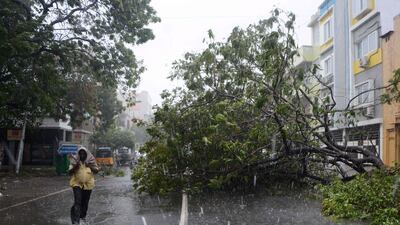Four people were killed on Monday when a cyclone whipped the coast of India’s eastern Tamil Nadu state, reviving memories of the devastating monsoon floods that killed more than 500 people last December.
Cyclone Vardah made landfall 30 kilometres north-east of Chennai, the state capital, just after noon, bringing with it 130-kilometre-per-hour winds and intense rain and forcing the evacuation of thousands living along the coast.
Chennai, a coastal city, shut down entirely, with schools and offices closed, and flights and trains cancelled. The state electricity board turned off the power supply in many areas, fearing short circuits or similar accidents due to the rain.
The Tamil Nadu government announced on Monday evening that four people had died in the cyclone, but released no further details.
The rain began late on Sunday and intensified through the night. By midmorning on Monday, trees had been uprooted, power cables snapped, and billboards felled in and around Chennai. Glass panels flew off the facade of the Hyatt Regency Hotel in the city centre.
The howling wind dropped briefly in the afternoon as the eye of the cyclone passed over Chennai, heading in a north-westerly direction but then picked up again in the evening.
The National Disaster Management Authority (NDMA) urged people in the Chennai area to stay indoors but said that as Vardah moved inland, towards the state of Karnataka, “it is going to de-intensify and become a depression by [Tuesday] morning”.
Although the cyclone’s winds wreaked damage, it was on a much smaller scale than that caused by the monsoon’s furious floods last year, said Ashok Nelliappan, a chartered accountant in Chennai. “We had to use boats to get around the streets last December because it rained so hard and so long.”
Meteorological authorities expected Cyclone Vardah to bring between 100-200 millimetres of rain over 48 hours in Chennai. By comparison, on December 1 last year, Chennai received 374 millimetres of rain, breaking a 100-year record. This came after the city had registered 1,218mm of rain — almost the average annual rainfall — in November.
Learning from last year’s experience, Mr Nelliappan said he had stocked up on food, torch batteries, candles and drinking water ahead of the cyclone. He also charged battery packs for his mobile phone in case it died before the power supply was turned back on.
“During the floods last year, I wanted to check on my mother, who is old and lives alone in a different part [of the] city,” he said. “But when my cell phone ran out of juice, there was no way to call her. It worried me sick.”
The Tamil Nadu government made similarly meticulous preparations for the cyclone.
More than 20,000 people living on the coast in and round Chennai were evacuated, and 266 temporary relief centres were opened to accommodate those fleeing the wrath of the storm.
The Indian navy put two ships on standby, with doctors on board as well as food and water for 5,000 people. Thirty two-man diving teams, seven army columns, and 15 units of the National Disaster Relief Force were also put on a state of high alert.
Army troops began some rescue and relief operations late on Monday afternoon, taking advantage of the temporary lull in the storm.
R Geetha, a retired teacher, ventured out of her apartment block at around 5pm to assess the damage on her street.
During last year’s floods, water levels rose high enough to cover Ms Geetha’s parked car, forcing her to sell it for scrap once the monsoon rains had subsided. Her new car survived Cyclone Vardah with only a few minor scratches after a tree branch fell on it.
“The street we live on has been blocked at either end by trees that have fallen across it, and I hope the municipality workers are able to remove them fast,” she said. “I suppose I should just be happy that I don’t have to buy yet another new car this time.”
foreign.desk@thenational.ae

